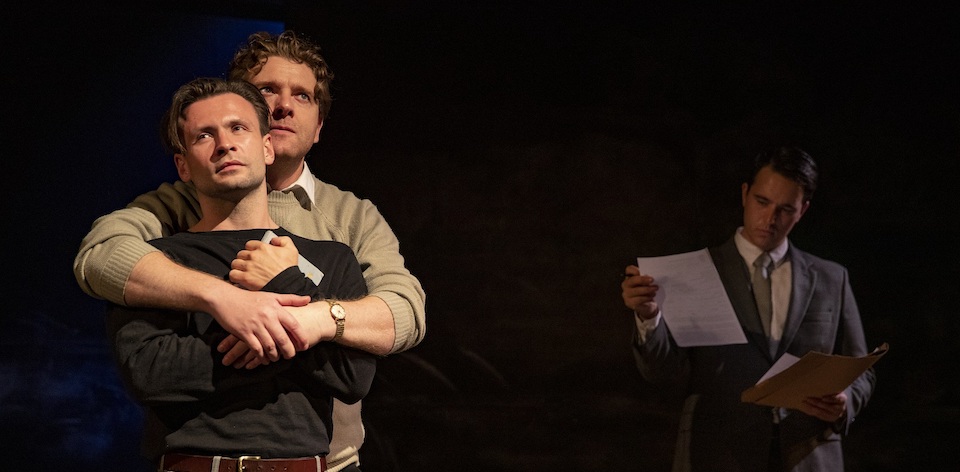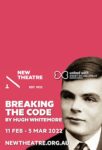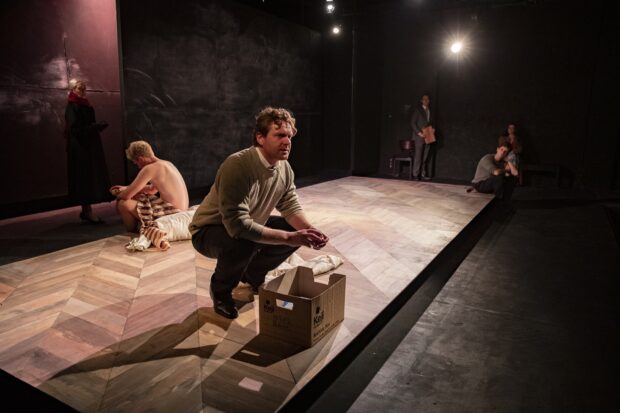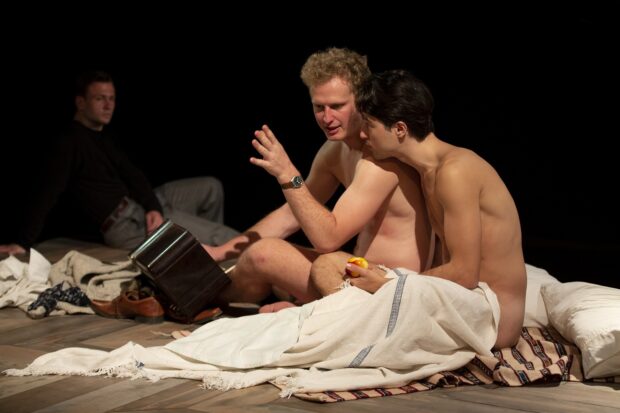It begins with a naked man standing casually on stage. It’s a moment of intimacy that lets the audience into a private world almost immediately. It’s one of many in this recent production of Hugh Whitmore’s BREAKING THE CODE, the fascinating and often tragic tale of computer science pioneer Alan Turing.
Originally staged in 1986 and later made into a TV film starring Derek Jacobi, Whitmore links the early cryptographic activities of Alan Turing with his attempts to come to terms with his own homosexuality. On the one hand, we see a man who has theoretical ideas about computers that are well ahead of their time. As he struggles to make people understand their meaning, the War Office directs his brilliant mind to cracking Germany’s Enigma Code.
For the last few years, the New Theatre in Sydney’s Newtown has run a terrific program of plays coinciding with the Sydney Gay & Lesbian Mardi Gras. While the weather constantly threatens to literally rain on our parade, director and production designer Anthony Skuse has followed director Matt Nagle’s Angry Fags and Beautiful Thing with a minimalist and affecting interpretation of Whitmore’s play.
Three different actors — Ewan Pedley, Harry Reid and Steve Corner — not only play Turing at different stages in his life, but as the various selves that he becomes for other people. Pedley, for example, is a stargazing and frustrated optimist who first shares his sexuality with school friend Christopher (Dallas Reedman). Later, it’s the older Corner who plays it much closer to the chest as his relationship with Ron Miller (Igor Bulanov) becomes known to police detective Detective Sergeant Rimmer, played by Jason Jefferies.
Meanwhile, it’s Reid who plays Turing during the War years that has to play the most complex balance. Reid throws down a confident façade, filled with the self-assuredness of his own mathematical genius. He begins a working relationship with Pat (Bridget Haberecht), one of the few people who understands his work. Turing keeps her at arm’s length despite her declarations of affection, something he is frank about being unable to return. On the other hand, we see an intimate love scene with Nikos (Dallas Reedman), played completely nude and communicating with each other across language divides.
Staging is minimal, with other characters acting just as much like a chorus. Two women play Turing’s mother (Leilani Loau and Jess Vince-Moin), with the elder version commenting on the younger’s decisions and vice versa. Less successful is the live singing coming from off-stage, from a performer who seems to have no other purpose than to pepper anachronistic covers of 80s pop tunes into a sparse production that already resonates with its light staging. Martin Portus is also excellent as the real-life Dilwynn Knox, imbuing the role with equal parts pomposity and pathos.
In 1999, Time Magazine named Alan Turing one of the most important people of the century. Last year, he was unveiled by the Bank of England as the face of the £50 note. His legacy is so strong that it is possible to say that everything from the writing of this review to your reading of it can be traced back in some way to Turning’s pioneering computer science. While the play might be seen as another tragic narrative in LGBTQIA+ history, its presence during the 2022 Sydney Gay & Lesbian Mardi Gras is a timely reminder of the struggles the communities have enduring and continue to fight despite the many positive outcomes in more recent decades.
2021 | UK | DIRECTOR: Anthony Skuse | WRITERS: Hugh Whitmore | CAST: Naomi Belet, Igor Bulanov, Steve Corner, John Grinston Bridget Haberecht, Jason Jefferies Leilani Loau, Ewan Peddley Martin Portus, Dallas Reedman Harry Reid, Jess Vince-Moin | PRODUCTION: New Theatre, Newtown | RUNNING TIME: 140 minutes incl. interval | RELEASE DATE: 11 February – 5 March 2022 (Performance viewed: 4 March 2022)







